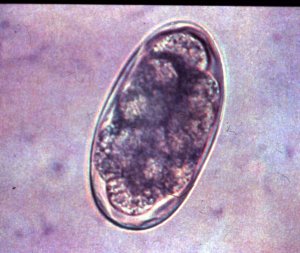 Back
Back
HOOKWORM First broadcast on www.provet.co.uk |
This information is provided by Provet for educational purposes only.
You should seek the advice of your veterinarian if your pet is ill as only he or she can correctly advise on the diagnosis and recommend the treatment that is most appropriate for your pet.
Hookworms are not as common as roundworms or tapeworms in dogs and cats, but they are seen and can cause a pretty unpleasant disease
Some types of hookworm (mainly those found in tropical and subtropical countries) are zoonoses and can be transmitted between man and animals
There are 3 main types of hookworm of importance to the dog and cat and to man :
- Ancyclostoma
- Uncinaria (most common in dogs in the UK)
- Necator
Animal hosts can become infected by :
- Ingesting infective larvae (L3 stage) in the environment
- Skin penetration of by infective larvae
In the case of Ancyclostoma caninum (found in tropical and subtropical countries) it can also be transmitted:
- By milk from a bitch to the puppies
- By reactivation of larval stages in pregnant bitches
- By eating another "accidental" host
The disease seen with hookworm infestation has the following signs :
- Sore footpads or dermatitis - as the parasite larvae can enter the body through the skin, and cause damage as they do so.
- Anaemia - because the parasites suck blood from the host across the intestinal wall, and haemorrhage occurs from the ulcers they leave when they unattach themselves from the gut lining.
- Black tarry faeces (called melaena) in animals with internal bleeding
- With some types of hookworm (Ancyclostoma) the host may cough because larval stages can pass through the lungs and be coughed up the windpipe
- Weight loss in chronic infections
- Death - especially in young puppies due to massive blood loss
The disease is confirmed by finding eggs or larvae of the worm in faeces.

A typical Uncinaria egg as seen on a faecal sample examined under a microscope
Fortunately, Hookworms are very sensitive to some of the common worming preparations that are available eg fenbendazole at a dose rate of 50mg/kg, so routine preventative worming programmes should avoid serious outbreaks of this disease. In the UK outbreaks of Uncinaria stenocephala infection do occur from time to time in kennels.
Provet Advice
Hookworm infection is preventable by using a routine preventative worming programme. Your veterinarian will advise you about the most appropriate drug and frequency of dosing for your pets.
Updated October 2013